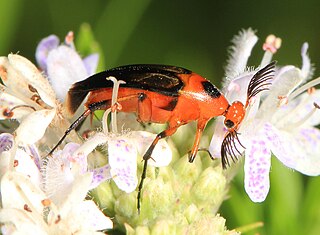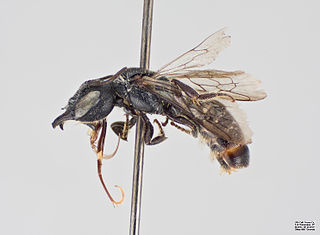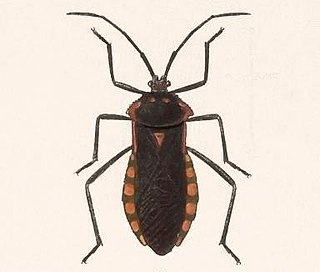
Channa gachua, the dwarf snakehead, is a species of fish in the family Channidae. The name "dwarf snakehead" is also used for several other species of small snakeheads. C. gachua is native to freshwater habitats in southern Asia, where it has a wide distribution from Iran to Indonesia. This fish is considered to be a species complex, a group of several closely related taxa with one name. It is likely at least three to four different species, and further research may differentiate them. A few species such as Channa harcourtbutleri have been separated from the complex in recent decades. The easternmost population of C. gachua is often recognized as a separate species C. limbata, while the isolated Sri Lankan population often is recognized as C. kelaartii.

Tanakia is a genus of cyprinid fish, consisting of five species that occurs in Eastern Asia. The type species is the Tanakia limbata.

Evergestis limbata is a species of moth of the family Crambidae first described by Carl Linnaeus in 1767. It is found in Europe.

The wildlife of Singapore is surprisingly diverse despite its rapid urbanisation. The majority of fauna that still remains on the island exists in various nature reserves such as the Bukit Timah Nature Reserve and the Sungei Buloh Wetland Reserve.

Phycosecidae is a small family of beetles, in the suborder Polyphaga. The species are small, about 1.5–3.5 mm in length. It contains the single genus Phycosecis with the following species:
Lepipaschia limbata is a species of snout moth in the genus Lepipaschia. It was described by Jay C. Shaffer and M. Alma Solis in 1994. It is known from Burkina Faso, West Africa.

Acacia limbata is a shrub belonging to the genus Acacia and the subgenus Juliflorae that is endemic across northern Australia.

Macrosiagon is a genus of wedge-shaped beetles in the family Ripiphoridae. There are more than 20 described species in Macrosiagon.

Phyllobrotica limbata is a species of skeletonizing leaf beetle in the family Chrysomelidae. It is found in North America.
Cicindela limbata, the sandy tiger beetle, is a species of flashy tiger beetle in the family Carabidae. It is found in North America.

Macrosiagon limbata is a species of wedge-shaped beetle in the family Ripiphoridae. It is found in Central America, North America, and South America.

Anacaena lutescens is a species of water scavenger beetle in the family Hydrophilidae. It is found in Africa, Europe and Northern Asia, and North America.
Pycnopsyche limbata is a species of northern caddisfly in the family Limnephilidae. It is found in North America.

Messua limbata is a species of jumping spider in the family Salticidae. It is found in the United States and Mexico.

Phenolia is a genus of sap-feeding beetles in the family Nitidulidae. There are about nine described species in Phenolia.
Bicellonycha is a genus of fireflies in the beetle family Lampyridae. There are more than 40 described species in Bicellonycha.
Odontomera limbata is a species of fly in the family Richardiidae.

Protosmia is a genus of subgenus chelostomopsis in the family Megachilidae. There are more than 30 described species in Protosmia.

Sephina is a genus of leaf-footed bugs in the family Coreidae. There are more than 20 described species in Sephina.













